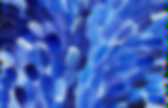

Herbal and Natural Remedies for ADHD That Work. Study unlocks Pycnogenol’s skin health mechanism. Victor Ferrari: 'An exciting and technically advanced investigation...' Daily supplements of an extract from French maritime pine bark may boost skin elasticity by 25% and skin hydration by 8%, says a new study.
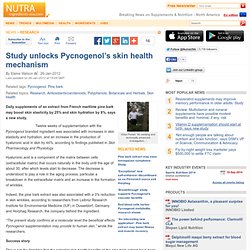
Twelve weeks of supplementation with the Pycnogenol branded ingredient was associated with increases in skin elasticity and hydration, and an increase in the production of hyaluronic acid in skin by 44%, according to findings published in Skin Pharmacology and Physiology. Hyaluronic acid is a component of the matrix between cells (extracellular matrix) that occurs naturally in the body until the age of about 30, after which levels start to decrease. The decrease is understood to play a role in the aging process, particular a breakdown in the extracellular matrix and an increase in the formation of wrinkles.
“The present study confirms at a molecular level the beneficial effects Pycnogenol supplementation may provide to human skin,” wrote the researchers. Success story Study details. How Taking Pycnogenol Can Help Adult ADHD. Surprising Research Challenges Our Understanding of Norepinephrine Deficiency - Natural Health Advisory. If you’ve ever screeched to a halt to avoid an accident and felt your heart race and your breathing quicken, you’ve felt some of the effects of norepinephrine, a key player in the fight-or-flight response.
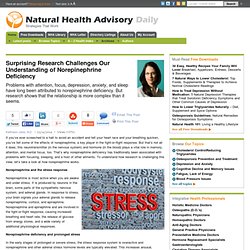
But that’s not all it does; this neurotransmitter (in the nervous system) and hormone (in the blood) plays a vital role in memory, attention, and mental focus, too. That’s why norepinephrine deficiency has traditionally been associated with problems with focusing, sleeping, and a host of other ailments. To understand how research is challenging this view, let’s take a look at how norepinephrine works. Norepinephrine and the stress response.
Others. ADHD & POTS. List of ADHD Medications - On-label and Off-label. Modafinil. Strattera. Reboxetine. L-Tyrosine. Zinc. Intuniv for ADHD. Intuniv : ADHD Non-Stimulant Medication Intuniv is a newer medication for the treatment of ADHD in children and teens that gained its approval from the FDA and was available to pharmacies in November, 2009.
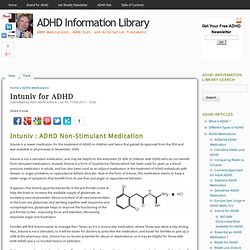
Intuniv is not a stimulant medication, and may be helpful to the estimated 25-30% of children with ADHD who do not benefit from stimulant medications. Instead, Intuniv is a form of Guanfacine (Tenex) which has been used for years as a blood pressure medication in adults, and has also been used as an adjunct medication in the treatment of ADHD individuals with temper or anger problems, or oppositional defiant disorder. Now in the form of Intuniv, this medication seems to have a wider range of symptoms that benefit from its use than just anger or oppositional behavior.
It appears that Intuniv (guanfacine) works in the pre-frontal cortex to help the brain to increase the available supply of glutamate, an excitatory neurotransmitter. Phosphatidylserine (PS) What Is It?
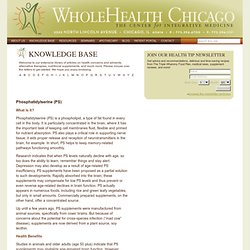
Phosphatidylserine (PS) is a phospholipid, a type of fat found in every cell in the body. It is particularly concentrated in the brain, where it has the important task of keeping cell membranes fluid, flexible and primed for nutrient absorption. PS also plays a critical role in supporting nerve tissue; it aids proper release and reception of neurotransmitters in the brain, for example. In short, PS helps to keep memory-related pathways functioning smoothly. Research indicates that when PS levels naturally decline with age, so too does the ability to learn, remember things and stay alert.
Up until a few years ago, PS supplements were manufactured from animal sources, specifically from cows’ brains. Health Benefits. DMAE (Dimethylaminoethanol) What Is It?
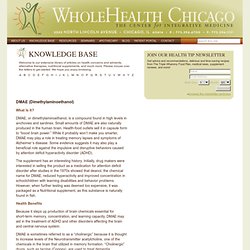
DMAE, or dimethylaminoethanol, is a compound found in high levels in anchovies and sardines. Small amounts of DMAE are also naturally produced in the human brain. Health-food outlets sell it in capsule form to “boost brain power.” While it probably won’t make you smarter, DMAE may play a role in treating memory lapses and symptoms of Alzheimer’s disease. Some evidence suggests it may also play a beneficial role against the impulsive and disruptive behaviors caused by attention deficit hyperactivity disorder (ADHD).
The supplement has an interesting history. Health Benefits Because it steps up production of brain chemicals essential for short-term memory, concentration, and learning capacity, DMAE may aid in the treatment of ADHD and other disorders affecting the brain and central nervous system. DAVID GERSTEN M.D. Dr. David Gersten: Natural Treatment of Depression. By David Gersten, M.D. • June 2011 Natural Treatment of Depression With depression and mood disorders rising to epidemic levels, we need to move beyond the initial treatment options of psychiatry, namely medication, and embrace a more natural and complete treatment approach.
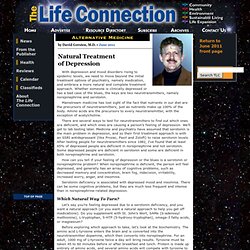
Whether someone is clinically depressed or has a bad case of the blues, the keys are two neurotransmitters, namely norepinephrine and serotonin. Mainstream medicine has lost sight of the fact that nutrients in our diet are the precursors of neurotransmitters, just as nutrients make up 100% of the body. Amino acids are the precursors to every neurotransmitter, with the exception of acetylcholine. There are several ways to test for neurotransmitters to find out which ones are deficient, and which ones are causing a person’s feeling of depression. Translational Psychiatry - Glutamate/glutamine and neuronal integrity in adults with ADHD: a proton MRS study.